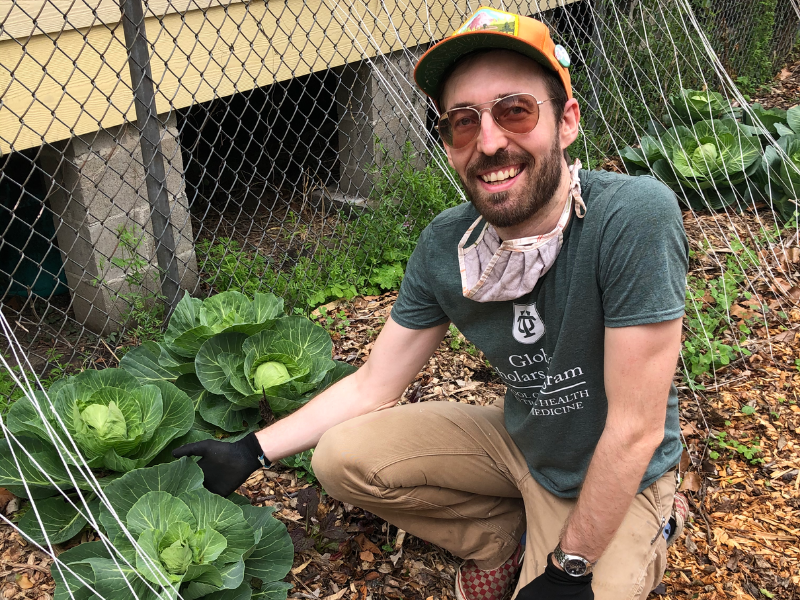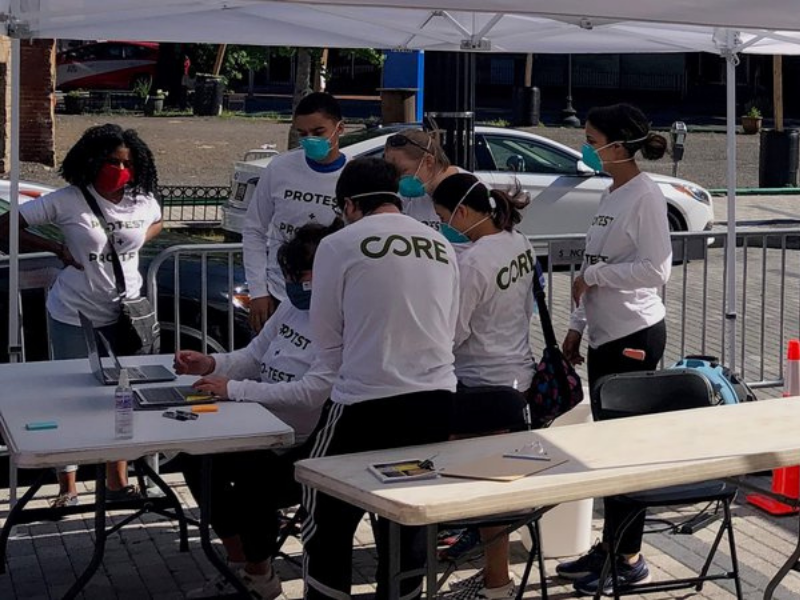Coverdell Fellow at Tulane University helps combat COVID-19

Christopher Taylor served as a Health Volunteer in Senegal from 2016 to 2019. Prior to serving, he received a bachelor’s degree in French and with a minor in community health from Portland State University. He is currently a Coverdell Fellow pursuing a master’s program in public health/epidemiology at Tulane School of Public Health and Tropical Medicine. He is also Tulane’s Global Scholars Program coordinator.
Note: This article was originally published on Peacecorps.gov and is republished here with permission.
When the COVID-19 pandemic struck in the spring of 2020, I was weighing decisions about graduate school while working a variety of jobs, from child care to ride-share driving.
I had been back in the U.S. for less than a year after completing my Peace Corps service in Senegal, and had just moved across the country from Oregon to Atlanta. As the COVID-19 pandemic became more and more severe, it became clear that all the jobs I had were about to dry up.
Once we went into lockdown, I spent my days researching the pandemic and wishing there was more I could do to help. Fortunately, my wish came true when a friend called to let me know about a new coronavirus testing operation in Atlanta run by a nonprofit organization called the Community Organized Relief Effort, or CORE. The organization was established in 2010 to provide disaster relief in the wake of the devastating earthquake in Haiti. My friend, who knew I served in the Peace Corps, asked me if I would join the crew. I was grateful to have an opportunity to be involved in controlling the pandemic.
As a part of CORE’s testing crew in the summer of 2020, I helped set up testing sites in and around Atlanta. On the first day of work, I learned many of my new colleagues were returned Peace Corps Volunteers who had been evacuated two months earlier.

Christopher Taylor and many colleagues at the Community Organized Relief Effort (CORE) helped set up COVID-19 testing sites in and around Atlanta.
In partnership with local organizations, we provided crucial COVID-19 testing to vulnerable communities, including those experiencing homelessness. The testing we did at transitional housing facilities determined if anybody in the community was infected. For those coming out of the correctional system, testing negative for COVID-19 removed one barrier to securing employment and further readjusting to life outside of prison. We even set up testing locations near the sites of racial justice protests so demonstrators could get tested and avoid spreading the virus to other demonstrators.
The work I did with CORE built on my previous experience in grassroots public health as a Peace Corps Volunteer. In Senegal, where I served from 2016-2019, I collaborated with women to promote maternal and child health and raised awareness about strategies for malaria prevention. I extended for a third year to act as Peace Corps Senegal’s malaria coordinator. I held trainings about malaria prevention and supported Senegal in its campaign to provide an insecticide-treated mosquito net to every Senegalese citizen.
My Peace Corps experience and subsequent work in COVID-19 testing with CORE confirmed my interest in working in public health, especially the field of epidemiology.
At the end of the summer of 2020, I moved from Atlanta to New Orleans to start a master’s program in public health/epidemiology at Tulane School of Public Health and Tropical Medicine. I was accepted to the program as a Peace Corps Coverdell Fellow, a program for returned Volunteers that provides reduced tuition fees and opportunities to intern with organizations that support underserved communities.
Studying public health during a pandemic certainly provides excellent context for what we are learning in the virtual classroom. While I enjoy learning the theories and methodologies involved in managing epidemics, there is nothing that compares to the experience of meeting people where they are, both literally and figuratively, to address health issues.
In addition to my graduate studies, as a Coverdell Fellow I am responsible for coordinating Tulane’s Global Scholars Program, which prepares students for international work in global health. We hold biweekly meetings to discuss current health issues ranging from COVID-19 to food security. We engage with experts in the field via Zoom to learn more about their work and get a better perspective on the many avenues available in global health careers. To bring the spirit of service home, we organize community service events in New Orleans so students can apply their knowledge and offer support.
Pursuing a graduate degree during a pandemic has presented a number of challenges that wouldn’t be present during a normal school year. Most notably, it has been difficult to have meaningful interactions with fellow students. Global Scholars has worked hard to provide students with opportunities to engage with one another safely and meaningfully as we endure this challenging time. I hope that we will be able to take the lessons learned from studying public health during a pandemic to be smarter and wiser in addressing the global health issues of the future.
